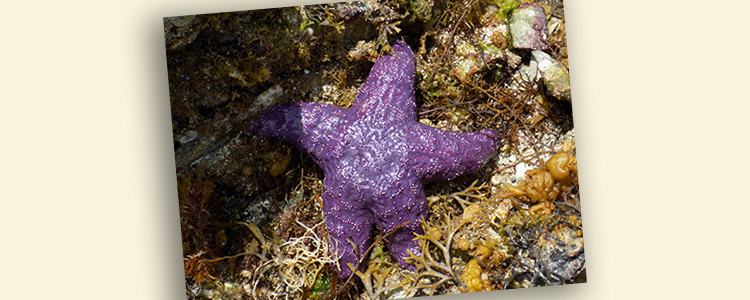||| FROM RUSSEL BARSH for KWIAHT |||
Kwiaht will be able to strengthen its protective and educational presence on the beaches and tide pools around Indian Island this summer, thanks to a generous grant from the Madrona Club’s Robin DiGeorgio endowment “in support of Kwiaht’s stewardship and good work on Indian Island”.
Daytime minus tides have attracted more than 4,000 summer visitors each year to the 2-acre island in Fishing Bay with its brightly colored wildflowers, nesting birds, extensive eelgrass meadows, and conspicuous orange and purple sea stars.
An artist and longtime resident of Doe Bay who served as president of the Madrona Club for many years, Robin DiGeorgio left an endowment to the club for “charitable and educational endeavors”. Since its first meetings in 1906, the Madrona Club has invested in the island’s public library, schools, clinics, cemeteries, and the community center; lobbied for Mount Constitution to become a state park; and managed a scholarship fund for high school graduates. Its grant for stewardship of Indian Island is in keeping with this century-long tradition.
Although the island itself is part of the San Juan Islands National Monument, the tidelands surrounding it are owned by the state, and not yet accorded any special status. In the absence of an effective federal or state presence, community volunteers coordinated and
trained by Kwiaht have greeted visitors and promoted informed, sustainable enjoyment of this unusual waterfront ecosystem since 2009. Kwiaht scientists have also monitored changes in the health of the Indian Island ecosystem, from clams, crabs and sea stars to fish and shorebirds.
The National Monument continues to promote recreational tourism and has no plans to restrict visitor access to the island, Barsh says. He favors asking the state Department of Natural Resources to designate Fishing Bay an Aquatic Reserve, which would empower islanders to work with state biologists on a conservation plan that would be enforceable under state law.
Aquatic Reserves are funded by the state legislature, and managed by the communities in which they are located. Barsh was instrumental in the establishment of the Cypress Island Aquatic Reserve, and believes that this legal status would enable islanders to set conservation goals and manage what kinds of activities are permitted. He also contends that islanders should work directly with Tribes that have ancestral interests in Indian Island to ensure that cultural resources are respected.
In the meantime, Barsh says, the Madrona Club grant will go a long way to maintain the necessary community presence at Indian Island during the coming summer. “And we will be able to recruit and pay a Youth Steward to join our Indian Island team, so interested high school-age islanders should be sure to contact Kwiaht for an application.”
**If you are reading theOrcasonian for free, thank your fellow islanders. If you would like to support theOrcasonian CLICK HERE to set your modestly-priced, voluntary subscription. Otherwise, no worries; we’re happy to share with you.**








